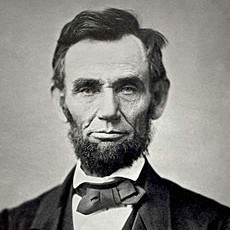 Abraham Lincoln (February 12, 1809 – April 15, 1865): Considered one of the great presidents of the United States, Abraham Lincoln was the 16th president. Lincoln served as President from March 1861 until his assassination in April 1865.
Abraham Lincoln (February 12, 1809 – April 15, 1865): Considered one of the great presidents of the United States, Abraham Lincoln was the 16th president. Lincoln served as President from March 1861 until his assassination in April 1865.
Big accomplishments: Lincoln led the United States through the Civil War, abolished slavery, strengthened the federal government, and modernized the economy.
Background: Reared in rural Kentucky and Indiana by an impoverished family, Lincoln held various odd jobs throughout his early years. By the 1830s, Lincoln became a self-educated lawyer and statesmen in the Illinois legislature. Lincoln was a staunch advocate of rapid economic modernization through banking, canals, railroads, and tariffs to encourage the building of factories. Lincoln served a single term in Congress in the late 1840s where he notably opposed the war with Mexico and criticized the presence of slavery in the nation’s capital.
Ascent to the presidency: After several highly publicized debates in 1858, during which he spoke out against the expansion of slavery, Lincoln lost the U.S. Senate race to his archrival, Democrat Stephen Douglas. But in 1860, this moderate from a swing state secured the Republican Party’s presidential nomination. Winning the general election on the strength of Northern votes, his election prompted seven Southern slave states to form the Confederacy before he took office. No compromise was achieved and war broke out in April 1861 as four more slave states joined the Confederacy.
Considered an exceptionally astute politician, Lincoln managed his own re-election in 1864. As the leader of the moderate faction of the Republican Party, he confronted Radical Republicans who demanded harsher treatment of the South, War Democrats who called for more compromise, antiwar Democrats called Copperheads, who despised him and emancipation, and irreconcilable secessionists who plotted his death. Politically, Lincoln fought back with patronage, by pitting his opponents against each other, and by appealing to the American people.
How he died: Six days after the surrender of Confederate commanding general Robert E. Lee, Lincoln was assassinated on April 15, 1865, by John Wilkes Booth, a noted actor and Confederate sympathizer.
Claim to fame: The Gettysburg Address and Emancipation Proclamation exemplify Lincoln’s brilliant writing, incisive logic, and devotion to the United States of America. His leadership during the Civil War preserved the Union while strengthening the nation’s dedication to equal rights, liberty, and democracy.
Sources: A. Lincoln by Ronald White, Jr., Wikipedia, President Lincoln’s Cottage, WhiteHouse.gov, Biography.com, BrainyQuotes.com
Mary Lincoln (December 13, 1818 – July 16, 1882): Wife to the 16th president of the United States, Abraham Lincoln, Mary was instrumental in his political rise. As First Lady, she attempted to increase the social stature and influence of the presidency.
Background: Born to the wealthy, slave-owning Todd family in Lexington, Kentucky, Mary Lincoln benefitted from a refined education. Her father was a close friend of Senator Henry Clay and she enjoyed the political discussions that often occurred in the household. After moving to Illinois, she married Abraham in 1842. Her fierce demeanor, intelligence, and Todd family connections helped strengthen her husband’s early political career.
Devoted parents, Mary was often tasked with raising their four sons (Robert, Edward, William, and Thomas) alone as Abraham traveled the Illinois court circuit. Tragedy often befell the Lincolns, as it did most Americans, through childhood disease. Edward died of tuberculosis at age three in 1850, William of typhoid fever at age 11 in 1862, and Thomas likely of pneumonia at age 18 in 1871.
First Lady: Signifying Mary’s importance, when Abraham Lincoln successfully won the 1860 election, he exclaimed to his wife: “Mary, Mary, we have been elected president!” As First Lady, Mary was determined to renovate the White House and establish a grandeur she felt befitting the presidency. Unfortunately, her attempts to hide excessive spending caused scandal and embarrassment for the Lincoln family. The Northern public also criticized the First Lady for her Southern roots and for several of her brothers and half-brothers fighting for the Confederacy.
Despite these public embarrassments, Mrs. Lincoln staunchly supported the Union war effort by routinely visiting hospitals for wounded soldiers and contributing money to charities supporting freed slaves. The end of the Civil War in April 1865 did not spell the end of Mary’s misfortune, however. Her husband was assassinated by her side days after the war finished. Despite a yearly pension granted by Congress in 1870, Mary lived in constant fear of debt for the rest of her life. Her lone-surviving son, Robert, had Mary briefly committed to a mental institution in 1875 due to her often erratic behavior. The two remained estranged for years afterwards.
How she died: Suffering from migraines, cataracts, several painful falls, and a stroke, Mary’s health deteriorated through the 1870s. She finally succumbed to the various ailments on July 16, 1882. She was buried alongside her husband and three of their sons in Springfield, Illinois.
Sources: Mrs. Lincoln: A Life by Catherine Clinton, National First Ladies’ Library, Wikipedia
For more information on President Lincoln, visit the Grateful American Series at www.gratefulamericanfoundation.com.
